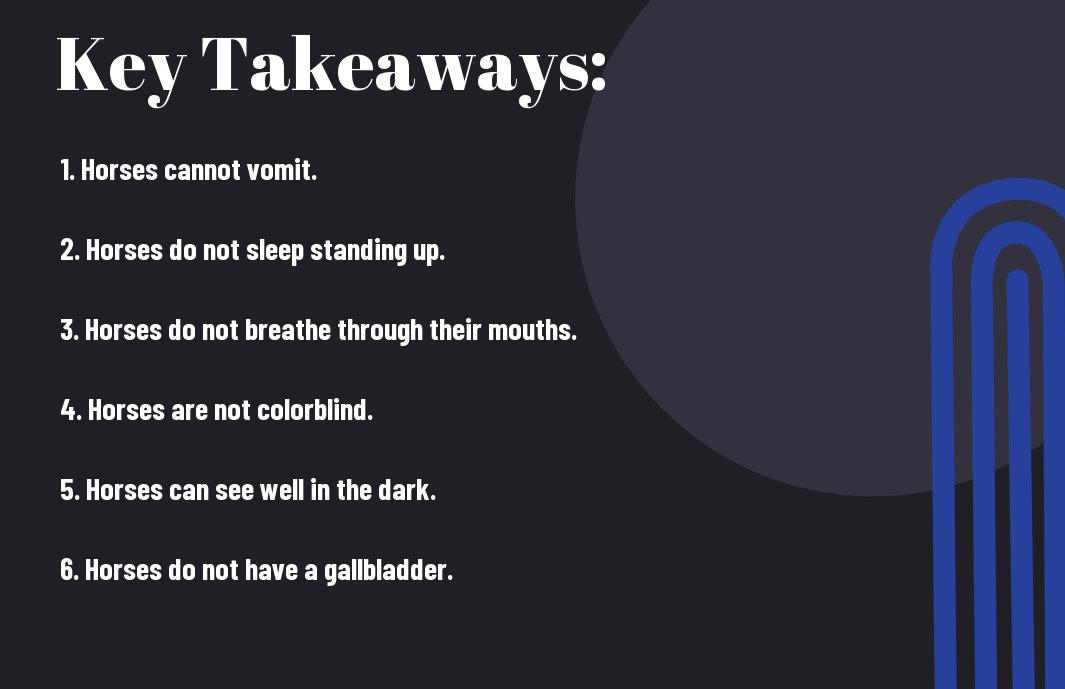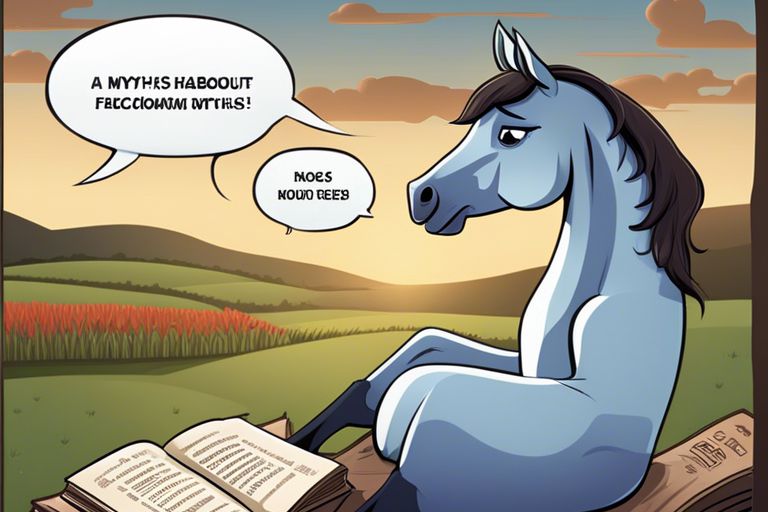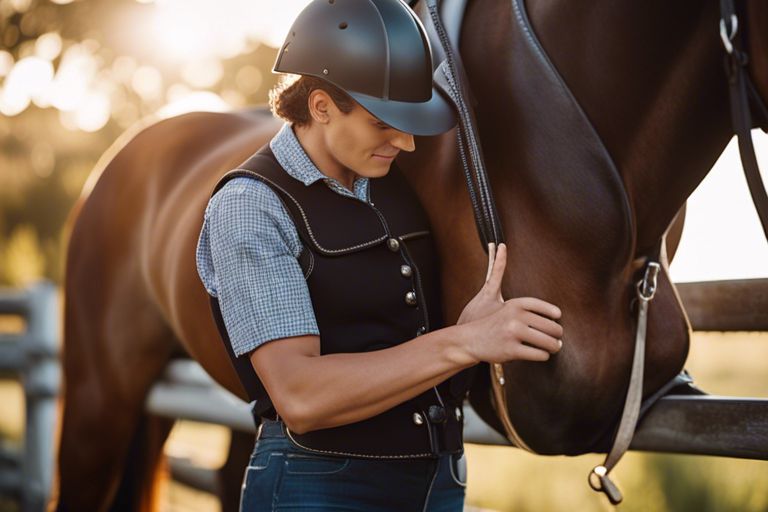Many horse-related myths have been circulating for years, but it’s time to separate fact from fiction. In this informative piece inspired by the witty Mark Twain, we will shed light on the truth and debunk common misconceptions about these majestic creatures. So saddle up and get ready to learn the real facts about horses!


The Myth of Horses Being Colorblind
The Origins of the Myth
Before we examine into debunking this myth, let’s explore where it originates. The misconception that horses are colorblind likely stems from their inability to perceive the same range of colors as humans. While horses do see colors differently than us, they are far from being unable to see any color at all.
Scientific Evidence to the Contrary
On the contrary, scientific studies have shown that horses are not colorblind. They can actually see a range of colors, though not as vividly as humans. Horses have dichromatic vision, meaning they can differentiate between some colors but might struggle with others.
For instance, research indicates that horses have difficulty distinguishing between red and green hues. This is why certain obstacles in show jumping competitions are designed in contrasting colors to ensure the horses can perceive them clearly. While their color perception may not be as refined as humans’, horses are definitely not colorblind.
Horses Are Not as Dumb as You Think
Some people underestimate the intelligence of horses, believing them to be simple and unintelligent creatures. However, this couldn’t be further from the truth. Horses are actually highly intelligent animals with the ability to learn, problem-solve, and communicate with humans in various ways.
Intelligence in Horses
Horses are incredibly perceptive animals that possess a keen sense of awareness and the ability to learn complex tasks. They are known to remember human faces and voices, as well as cues and commands given to them. This shows their cognitive abilities and capacity for learning and remembering information.
Problem-Solving Abilities
Horses have shown remarkable problem-solving abilities in various situations. They can figure out how to open latches, navigate obstacles, and even cooperate with other horses to solve tasks. Their problem-solving skills not only showcase their intelligence but also their adaptability and resourcefulness.
The next time you interact with a horse, pay attention to their behavior and responses. You may be surprised by the intelligence and problem-solving skills they exhibit. Engaging with horses in activities that challenge their minds can help stimulate their intelligence and deepen your bond with them.

Debunking the “Flight Animal” Myth
Now, let’s debunk the common myth that horses are just flight animals with no ability to control their instinctual responses. By examining their behavior in the wild and understanding the nuances of their flight response versus fear response, we can gain a more accurate understanding of these majestic creatures.
Horses in the Wild
To truly understand horses, we must look at their behavior in the wild. While it’s true that horses have evolved as prey animals, constantly aware of potential threats in their environment, they also exhibit complex social structures and nuanced communication within their herds. This goes to show that horses are not just mindless creatures driven solely by fear – they have the capacity for sophisticated relationships and behaviors.
Flight Response vs. Fear Response
With a deeper understanding of horses’ behavior, it becomes clear that their flight response isn’t just a knee-jerk reaction to any perceived threat. While they may have a strong instinct to flee from danger, they are also capable of discerning between real threats and harmless stimuli. Training and desensitization can help horses differentiate between a true threat and a harmless noise or movement, allowing them to react appropriately.
Response: By recognizing the intelligence and nuanced responses of horses, we can better understand and connect with these amazing animals. They are not simply “flight animals” but complex beings capable of forming deep bonds with humans and exhibiting a range of emotions and behaviors.
The Truth About Horse Vision
After all those years of hearing that horses only see in black and white, it’s time to set the record straight. Contrary to popular belief, horses do not see in just black and white; they see colors. While their color vision isn’t as vivid as ours, they can distinguish between some colors, especially blues and greens. So, next time you think about a horse seeing the world in monochrome, remember that they have a bit more color in their lives than you might have thought.
Do Horses See in Black and White?
One of the biggest myths about horses is their supposed black-and-white vision, but this is simply not true. Horses have dichromatic vision, meaning they see in two main color groups – blues and greens. They might not see the full spectrum of colors like humans do, but their colorful world is definitely not shades of black and white.
Visual Acuity and Perception
Vision is a crucial sense for horses, as they are prey animals that rely on spotting danger from a distance. They have impressive peripheral vision, nearly 350 degrees around them, allowing them to see almost everything in their surroundings without needing to move their heads. However, their binocular vision is narrower than humans, which means they may struggle with depth perception and focusing on objects directly in front of them.
About their visual acuity and perception, it’s imperative to understand that while horses excel at detecting motion and noticing even the slightest changes in their environment, they might not be as sharp when it comes to details up close. So, when you approach a horse, keep in mind their different visual strengths and limitations to ensure clear communication and safety.
Separating Fact from Fiction: Horse Communication
Once again, it’s time to clear up some myths and misconceptions about how horses communicate with humans. Let’s examine into the world of horse communication and debunk some common misunderstandings.
Body Language and Vocal Cues
Any seasoned horse owner will tell you that horses mainly rely on body language to communicate. From flicking their ears to stomping their feet, horses have a vast array of non-verbal cues that convey their feelings and intentions. Paying attention to these subtle signals can help you better understand and bond with your equine companion. While vocal cues such as neighs and whinnies are also utilized by horses, they are usually secondary to their body language.
Misconceptions About Horse Whispering
Vocal cues, such as whispers, are not the primary means of communication between horses and skilled trainers. Contrary to popular belief, horse whispering is not about using hushed tones to communicate with horses. Instead, it revolves around understanding and interpreting a horse’s body language to establish a strong connection based on trust and respect. Skilled horse whisperers can read subtle cues from horses and respond in a way that fosters a deep bond based on mutual understanding.
Misconceptions about horse whispering often paint a romanticized picture of a mystical connection between a whisperer and a horse. In reality, it’s all about patience, observation, and clear communication through body language rather than whispered words.

The Myth of Horses Being Lazy
Many people believe the myth that horses are lazy animals, often associating them with just standing around in pastures. However, this couldn’t be further from the truth. Horses have a natural grazing behavior that involves them constantly moving and grazing throughout the day.
Natural Grazing Behavior
Behavior wise, horses are designed to eat small amounts of food continuously throughout the day. Their digestive systems are meant for this constant grazing, which keeps them on the move. So, when you see a horse seemingly idle in a field, they are actually engaging in their natural behavior of grazing and moving around.
Exercise Needs and Motivation
An important aspect to consider when debunking the myth of horses being lazy is understanding their exercise needs and motivation. Horses are incredibly motivated animals, especially when given a task or when they form a bond with their rider. They are powerful, athletic creatures that require regular exercise to maintain their physical and mental well-being.
Ensuring that your horse gets enough exercise and mental stimulation is crucial in keeping them happy and healthy. Training sessions, trail rides, or engaging in activities such as jumping or dressage can provide the necessary stimulation to prevent any perceived laziness in your horse.
Summing up
Hence, after delving into the myths about horses and unraveling the truth behind them, you now have a clearer understanding of these majestic creatures. Be mindful of, not all myths hold water when it comes to horses, so it’s crucial to separate fact from fiction. By debunking these misconceptions, you can develop a deeper appreciation for horses and their behaviors, and build a stronger bond with these incredible animals.
FAQ
Q: What are some common myths about horses?
A: Some common myths about horses include them being color-blind, having a high pain tolerance, and being unable to lie down for long periods.
Q: Are horses really color-blind?
A: No, horses are not color-blind. They can see colors, but their vision is different from humans as they have more rods than cones in their eyes.
Q: Do horses have a high pain tolerance?
A: While horses may have a stoic nature that makes it seem like they have a high pain tolerance, they can actually feel pain and it’s important to monitor their health and well-being closely.
Q: Can horses lie down for long periods?
A: Yes, horses can lie down for short periods to rest and sleep. It is a common misconception that horses cannot lie down for long periods, but they do lie down for REM sleep which is vital for their health.
Q: Do horses need shoes on all four hooves?
A: Not all horses need shoes on all four hooves. The need for shoes depends on the individual horse’s hoof health, workload, and terrain they are working on.











